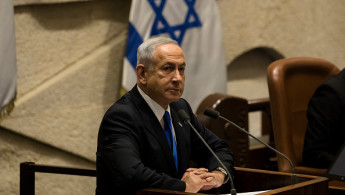Israel's war crimes in Lebanon give Netanyahu's Likud poll boost
Israeli Prime Minister Benjamin Netanyahu's Likud party has received a boost in recent surveys following Israel's massive air campaign in Lebanon and a series of hits on senior Hezbollah figures.
Lebanon has been facing hundreds of airstrikes across the country over the past week in a dangerous upsurge in attacks that has seen more than 700 killed and thousands injured. The intensification comes as Israel’s brutal war in Gaza nears its 12th month with the Israeli army's campaign facing accusations of committing war crimes, including genocide.
A new survey by Maariv in Israel published on Friday shows Likud strengthened in a poll that asks respondents who they would vote for in an election. Netanyahu's right-wing party currently leads the coalition government which is propped up by six parties, including far-right anti-Arab Religious Zionist Party and Otzma Yehudit.
It shows Likud gaining 25 seats if new Knesset parliamentary elections were held today, marking a one-seat increase and the highest result since the outbreak of war last October. Likud would also be toping its main rival with 25 seats in comparison to 19 for the opposition National Unity party led by Benny Gantz, who resigned from government earlier this year over Netanyahu's handling of the war.
But when respondents were asked to choose a prime minister, former prime minister Naftali Bennett of the New Right party gained 43 percent of support rather than Netanyahu’s 37 percent.
The survey also showed widespread support for the opposition groups over the current collation bloc. According to the results, the opposition coalition gained 57 seats compared to 53 for Netanyahu.
Israeli politics have been split over the prime minister's handling of the war in Gaza.
Over the course of the conflict, which started last October, those on the far-right have called for more extreme measures against Palestinians in Gaza while those in opposition have accused Netanyahu of prioritizing his position rather than ensuring the safe return of some 100 captives in Gaza.
Large protests have taken place regularly in Tel Aviv calling for Netanyahu to resign, with the Israeli public increasingly irked by the premier’s desire to prolong the war and failure to bring about a deal to release the captives.
However, the poll results suggest that his decision to launch a major air campaign against Hezbollah in Lebanon has boosted his ratings. Some 60,000 Israelis have been displaced from their homes in northern Israel since the start of the cross-border fire nearly 12 months ago, and Netanyahu said recently returning them is a war objective.
While Israel is claiming to be striking "Hezbollah targets", dozens of women and children have been killed and wounded.
A family of nine were killed this morning by a strike in the border village of Shebaa.
The air campaign follows dramatic events in Lebanon last week when the Shia militant group's telecommunications devices exploded in an apparent Israeli espionage attack.
The incident, alongside the air strikes this week, has been condemned for disregarding civilians who were caught up in the attacks.
The International Committee of Jurists (ICJ) MENA director said this week that Lebanese citizens "don’t lose protection under international law just because they live in the same cities or buildings as Hezbollah members or fighters".
Saïd Benarbia said: "The extremely high number of civilian casualties, in the space of just a few hours, points to the indiscriminate and disproportionate nature of the IDF’s attacks in violation of international humanitarian law."
The global NGO of top judges and lawyers condemned Israel’s military for "intentionally causing the unlawful killing of very high numbers of civilians for each military target".
"Such practices constitute war crimes under international law, either as direct attacks against civilians and civilian objects, in violation of the principle of distinction, or as indiscriminate or disproportionate attacks."
Israel has vowed to continue striking Lebanon and is threatening a ground invasion into the southern area and rejected a French and US joint call for a 21-day ceasefire.





 Follow the Middle East's top stories in English at The New Arab on Google News
Follow the Middle East's top stories in English at The New Arab on Google News


